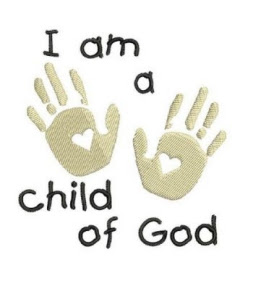God's Babies
John’s prologue is quite intricate. It’s written in an ancient word scramble. If you take thought for thought starting at the beginning and the end and you work your way to the middle then you will see that the prologue carries an impressive consistency. When you do, you arrive at the hinge in which the gospel turns. The central message of the prologue and all of John is found in verse 12b:
But as fun as this is to say, the hard truth of the matter is that we don’t accept our identity as a child of God. To be a child of God would be to mimic the life of Jesus – right?
When I look out at Christians, especially in the Baptist world, we don’t love and don’t serve as well as we would like. We fight denominational wars and cast people away for being different. We draw lines in the sand and vote people in and out. Our churches decide who should be forgiven and who should be damned. We become tribal and introspective and build a callus over anything outside of our worldview.
This is not Jesus’ gift to us in the prologue. John says that all who call upon the name of the Lord are given power to become children of God. So why do we do it? Why do we fail to acknowledge the holiness of others? Why do we not see everyone as God’s beloved?
Because what you can’t see in yourself, you will never be able to see in others.
Being a child of God is what allows you to take love, peace, justice, righteousness and forgiveness to all people that you meet. It allows you not to judge.
But on an individual level we experience too much hurt and sorrow to be any different than who we always have been. The struggles of life create a callus. Never feeling like we have enough and always feeling inferior to those around us doesn’t make us want to love and especially forgive. People’s pain, sorrow and despair are too great to just cast it aside and say, “You’re forgiven.” We have our own pain and our own baggage. We have our own sensual and sexual need to be loved and to be served.
So as long as we can’t see ourselves as a child of God, we will fail to recognize these gifts in others.
But why is this important? Because it is as a child of God that you are sent out into this world. If you do not claim your identity as a child of God how will anyone see it in themselves through you? You are the mouthpieces of God and you must carry love not anguish in your heart. People are going to see hope through you. People are going to want to grow because of your willingness to grow. People are going to be willing to forgive because of your leadership to do so. People are going to see their true selves as a child of God because you do too.
But what you don’t see in yourself, you won’t see in others. You must claim your identity as a child of God so others can too.
But to all who received him, who believed in his name, he gave power to become children of God. (John 1:12b NRSV)This is the most important message for you to receive and to give others. “That for those who believe in Jesus’ name, power is given to them to become children of God.” We are God’s children.
But as fun as this is to say, the hard truth of the matter is that we don’t accept our identity as a child of God. To be a child of God would be to mimic the life of Jesus – right?
When I look out at Christians, especially in the Baptist world, we don’t love and don’t serve as well as we would like. We fight denominational wars and cast people away for being different. We draw lines in the sand and vote people in and out. Our churches decide who should be forgiven and who should be damned. We become tribal and introspective and build a callus over anything outside of our worldview.
This is not Jesus’ gift to us in the prologue. John says that all who call upon the name of the Lord are given power to become children of God. So why do we do it? Why do we fail to acknowledge the holiness of others? Why do we not see everyone as God’s beloved?
Because what you can’t see in yourself, you will never be able to see in others.
Being a child of God is what allows you to take love, peace, justice, righteousness and forgiveness to all people that you meet. It allows you not to judge.
But on an individual level we experience too much hurt and sorrow to be any different than who we always have been. The struggles of life create a callus. Never feeling like we have enough and always feeling inferior to those around us doesn’t make us want to love and especially forgive. People’s pain, sorrow and despair are too great to just cast it aside and say, “You’re forgiven.” We have our own pain and our own baggage. We have our own sensual and sexual need to be loved and to be served.
So as long as we can’t see ourselves as a child of God, we will fail to recognize these gifts in others.
But why is this important? Because it is as a child of God that you are sent out into this world. If you do not claim your identity as a child of God how will anyone see it in themselves through you? You are the mouthpieces of God and you must carry love not anguish in your heart. People are going to see hope through you. People are going to want to grow because of your willingness to grow. People are going to be willing to forgive because of your leadership to do so. People are going to see their true selves as a child of God because you do too.
But what you don’t see in yourself, you won’t see in others. You must claim your identity as a child of God so others can too.




Comments